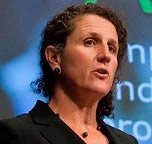On March 5, just before International Women’s Day, we mark the launch of On Norms and Agency: Conversations about Gender Equality with Women and Men in 20 Countries. This book is the result of an important partnership between the World Bank and the Rockefeller Foundation, and of vital qualitative work that accompanied the 2012 World Development Report on Gender Equality and Development.
Those whose voices we hear through this report—both men and women—emphasize a central point again and again: that the ability to make effective choices and exercise control over one’s life is a critical dimension of well-being.
At the World Bank, we see this book launch as an important foundation for new directions. Over the past couple of decades, we have rightly focused much attention on closing the gender gaps in education and health. And we continue to work on improving women’s economic opportunity, which still lags woefully behind men’s in every part of the world. But, I must admit, we have not worked systematically to enhance women’s voice, women’s agency and women’s participation in decisions that impact their lives.
That work is now beginning, on a number of fronts. Across the World Bank Group, we’re working to deepen our understanding of five expressions of women’s agency:
- Access to and control over property (land);
- Freedom from the risk of violence;
- Freedom of movement (localized & migration);
- Decision making over family formation (family planning, marriage & divorce, children); and
- The ability to have voice in society and influence policy (political and community participation).
In about a year, we are planning to launch a major report on Women’s Voice, Agency and Participation covering these topics, with the main objective of delivering policy-relevant conclusions and exploring how women’s rights, voice, agency and participation can be better integrated into World Bank analysis, dialogue and, ultimately, into our lending operations with governments.
So if I can leave you with one message here, it is that the voices speaking to us through the book we launch this week should give us hope. Even in the most remote and poorest reaches of the world, women and girls almost universally aspire to equality and to take charge over their own lives. This is a powerful force indeed, and we should do anything in our power to support them in their aspirations.
To add to the conversation on women’s empowerment, join us on March 8 at 9:30 a.m. EST (2:30 p.m. UTC) for a live online chat.
To learn more about the World Bank Group’s work on gender, visit: http://www.worldbank.org/gender.
This post originally appeared on the Rockefeller Foundation website.



Join the Conversation